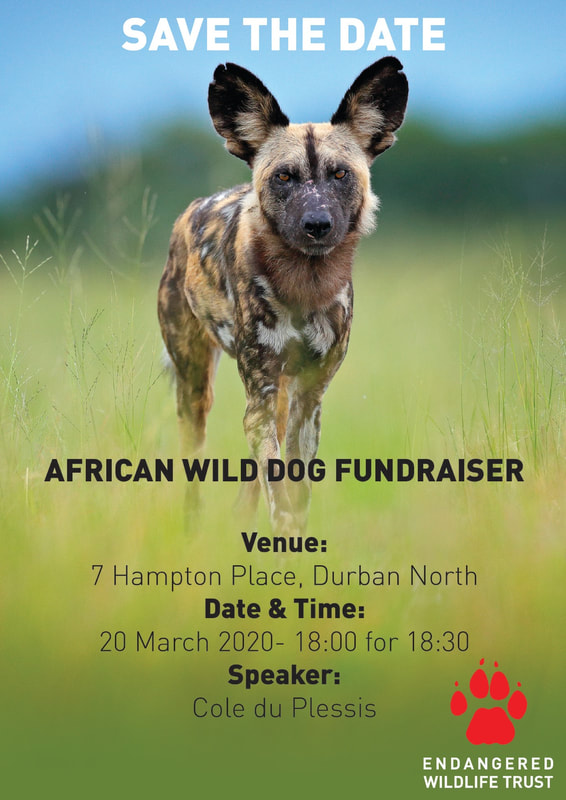Conserving predators in the wild is always a much harder sell than engaging the public to help preserve cute looking animals. The African Wild Dog (Lycaon pictus) is firmly on the endangered list and needs our assistance to survive into the 21C. The evocatively named, African Painted Dogs: conservation urgently required - and we are calling upon all the smart marketing possible to get folks to care about their fate. Helping animals that kill other animals is never easy, as human beings prefer to be the only animal on that particular Alpha list. We do not like wildness per se, especially those of us who live in the vicinity of wild predators.
Saving the African Wild Dog
Wolves are the ancestors of domesticated dogs and provide the perfect polarity between our hatred/fear and love/friendship to animals such as these. African wild dogs share a much earlier ancestor with wolves and dogs. Farmers and herders have traditionally exterminated wolves and wild dogs to protect their livestock. Of course, the majority of people, now, live in big cities and wild dogs are not a realistic concern for them. City dwellers can intellectually appreciate the beauty of killers from a distance, unlike those who make their living from the land. Historically, we have wiped out wild things from this planet (just ask indigenous peoples like American Indians and tribal Aboriginals). A few enclaves exist in tiny corners, here and there, where wild animals remain endangered. The oceans offer more opportunity for wildness but face their own unique challenges as well. Can nearly 8 billion people make room for wild things like African painted dogs in the 21C?
East African Origins for Wild Dogs & Us
Homo sapiens, that is us, originated from East Africa according to available archaeological evidence. We share a homeland with the East African wild dog, a noted subspecies recognised by the Mammal Species of the World. Perhaps on this basis alone, we should reach out a helping hand to a fellow traveller on the evolutionary road. Recent estimates place the population at less than 7 000 adults in the wild. The Endangered Wildlife Trust (EWT) has a Painted Wolves of Waterberg conservation project to help save these endangered dogs. Many people around the world are gripped by the very real fear that species like these will be completely wiped out. Extinction is just around the corner for the African Painted Dog.
Wildlife biologist Cole du Plessis is one individual doing his utmost to prevent the demise of the African wild dog. Conservationist Cole has a master’s in science specialising in Protected Area Management and has produced Part of the Pack – a documentary about the plight of African Painted Dogs in the wild. Check it out to see what you can do to help.
Saving the African Wild Dog
Wolves are the ancestors of domesticated dogs and provide the perfect polarity between our hatred/fear and love/friendship to animals such as these. African wild dogs share a much earlier ancestor with wolves and dogs. Farmers and herders have traditionally exterminated wolves and wild dogs to protect their livestock. Of course, the majority of people, now, live in big cities and wild dogs are not a realistic concern for them. City dwellers can intellectually appreciate the beauty of killers from a distance, unlike those who make their living from the land. Historically, we have wiped out wild things from this planet (just ask indigenous peoples like American Indians and tribal Aboriginals). A few enclaves exist in tiny corners, here and there, where wild animals remain endangered. The oceans offer more opportunity for wildness but face their own unique challenges as well. Can nearly 8 billion people make room for wild things like African painted dogs in the 21C?
East African Origins for Wild Dogs & Us
Homo sapiens, that is us, originated from East Africa according to available archaeological evidence. We share a homeland with the East African wild dog, a noted subspecies recognised by the Mammal Species of the World. Perhaps on this basis alone, we should reach out a helping hand to a fellow traveller on the evolutionary road. Recent estimates place the population at less than 7 000 adults in the wild. The Endangered Wildlife Trust (EWT) has a Painted Wolves of Waterberg conservation project to help save these endangered dogs. Many people around the world are gripped by the very real fear that species like these will be completely wiped out. Extinction is just around the corner for the African Painted Dog.
Wildlife biologist Cole du Plessis is one individual doing his utmost to prevent the demise of the African wild dog. Conservationist Cole has a master’s in science specialising in Protected Area Management and has produced Part of the Pack – a documentary about the plight of African Painted Dogs in the wild. Check it out to see what you can do to help.


 RSS Feed
RSS Feed

